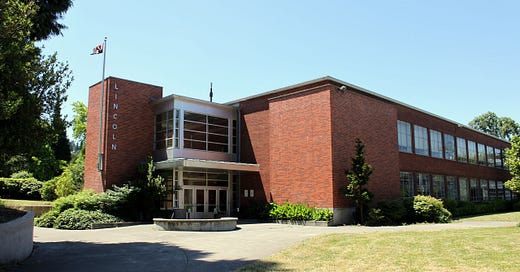Oregon Secretary of State Auditors’ Systemic Risk Report on Education
The Chair of the Quality Education Commission and a former public education advocate say Oregon's school funding is inadequate to meet its goals while performance metrics misdiagnose its problems
The average Oregonian supports public education funding and policy, but they may not have the wherewithal to dissect the recent, first-ever state auditor report on risks to the system.
Because we have a combined 61 years of experience in public education, including work to create the Student Success Act and the Quality Education Model reports, we offer our take on this report.
Essentially a message to the Legislature and State Board of Education, this risk assessment gets most of it right in its focus on unstable biennial funding, insufficient meaningful oversight of such programs as the for-profit online charter schools, lack of data transparency where and when it matters, and huge burdens created for school districts and the state with policymakers’ penchant for “flavor-of-the-month” education mandates.
State auditors are charged with taking a systems view, and though they are not education experts, they are organizational operations experts. The lens they bring to their oversight function provides a valuable service to taxpayers and system participants alike, all of whom presumably want the most effective enterprises possible.
Our only concerns with this report are that they are overly reliant on test scores to gauge student and school “performance”, and they fail to call out the mismatch between outcomes expectations on the one hand and budgets appropriated to achieve those outcomes on the other. This leads a reader to presume that the expectations are set correctly, that the resources to achieve them are adequate, and that the metrics used to assess schools and students are sound and meaningful tools that tell us what we want to know about our students and their progress.
Unfortunately, that’s where the report’s analysis breaks down.
In order to have an effective and high-performing system, five elements must be evident: clear and attainable expectations; funding adequate to full achievement of those expectations, broad understanding and application of appropriate practices inside that system; appropriate methods to evaluate the system correctly; and the ability to intervene in a helpful way. On at least two of these elements, Oregon is lacking.
Public education’s chronic underfunding, even with the additional resources of the Student Success Act, means that school districts are expected to attain 100 percent performance for 80 to 90 percent of the resources needed to achieve those ambitions. Additionally, some of the tools used to evaluate how well schools and students are doing are themselves fraught.
For instance, standardized testing is commonly relied upon as an easy grab-and-go metric of success or failure, but should it be?
Unsound tests designed by non-educators tend to label and sort students, rather than reveal their learning needs. They have long plagued our accountability systems, yet we persist in relying on them to reflect student success because we do not have an alternative data point. Our policymakers have come to value that which is measurable, rather than measure what is valuable, and that can lead us to draw the wrong conclusions about schools, students and educators. One has only to read the comments following news stories on Oregon’s recent move to suspend the Essential Skills regime while it undergoes an upgrade to know that our over-reliance on high-stakes testing has created confusion and eroded support for public schools.
Another error in the report is its assumption that state-by-state comparisons of graduation rates are a valid metric of school quality. This is problematic because, in addition to funding their schools differently, each state has different graduation requirements and varying levels of fidelity to accurate reporting. Do an internet search of the way Texas fudges its data; you’ll see that few students are listed as dropouts. They record them as “homeschoolers” to avoid a low score. Oregon has, by comparison, had higher standards for graduation and greater integrity in reporting its data.
Why does this matter? Comparing states on what the federal government calls the “four-year cohort graduation rate” is an apples-to-oranges exercise that leads politicians and anti-education forces to launch frenzied attacks against our schools. The four-year timeline is also problematic, because programs such as “Oregon Scholars” deliberately allows students to stay one year beyond grade 12 to take college classes for free, using state K-12 resources. Those students aren’t failures, but they do not appear as graduates in the “four year cohort” rate in school reports, thereby creating the appearance that we are “failing” them.
While it is fine to address Oregon graduation rates and work to improve them, especially to close the equity gaps, it is misleading to make inferences about school quality by comparing our state to others.
A new slate of policymakers will be sent to Salem by general-election voters in November. We hope they will take to heart this report – with so much that it got right – but also train their 90 sets of eyes on the things that matter most: stable and adequate resources, fewer “flavor-of-the-month” bills, and long-term support for our greatest tool to better the lives of every child: our public schools.








The phrase “ Our policymakers have come to value that which is measurable, rather than measure what is valuable,” so well sums up a significant part of the problem. Thank you for this thoughtful article. It should be required reading for all of our state lawmakers.
One comment about those coming to Bend from other states. This, as John and Laurie have said, is a national problem. Just as legislation at the national level is only as effective as it implemented at that state and local level, our representatives at all levels need to be included in this discussion. There are national professional organizations that have yet to address the political efforts to undermine the best efforts of educators, researching studying cognitive development, and educational theorists like Kieran Egan, respected by the international educational community but seldom mentioned south of the Canadian border, but whose work on 5 stages of cognitive development have yet to gain traction in the USA, whose death last month was hardly noticed:
In his obituary, a colleague in Mexico shared a list of his advice to her which speaks to the work that you are doing:
Believe in your students, in the value of their ideas, in their willingness to learn, give them opportunities to also believe in themselves.
Support your students' projects and initiatives, give them quality feedback, listen carefully.
Question your own beliefs, your ideas, your predispositions about the world.
Learning is the most beautiful capacity we have.
There is no authentic wisdom without humility.
Be coherent. What you teach about education, live it, too. The best teaching is given by example.
Dedicating ourselves to education is a mission that carries great responsibility. Improving it is possible.
An education where imagination is the heart of learning is possible.
Our mentors are many; their followers are few. Your efforts are a continuation of their struggle to change the world through education. Crisis is where opportunity and danger are one. Let us recognize this moment for what it is.
Thank you for letting me be part of your discussion.